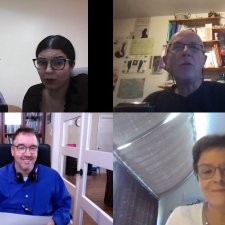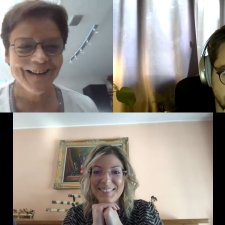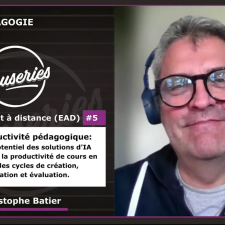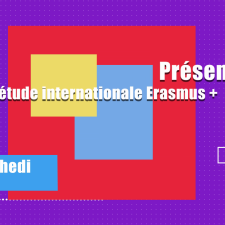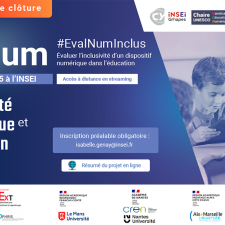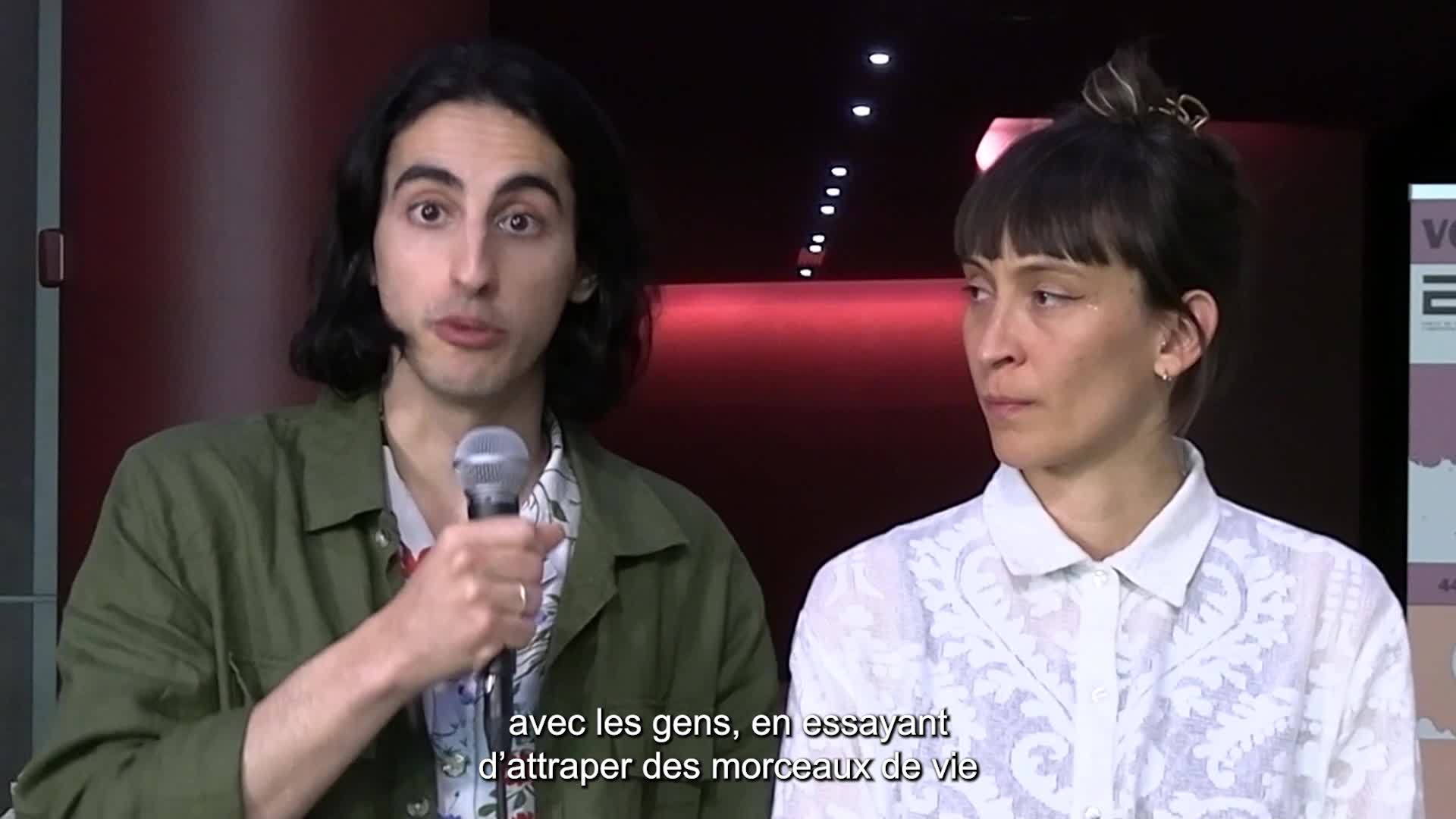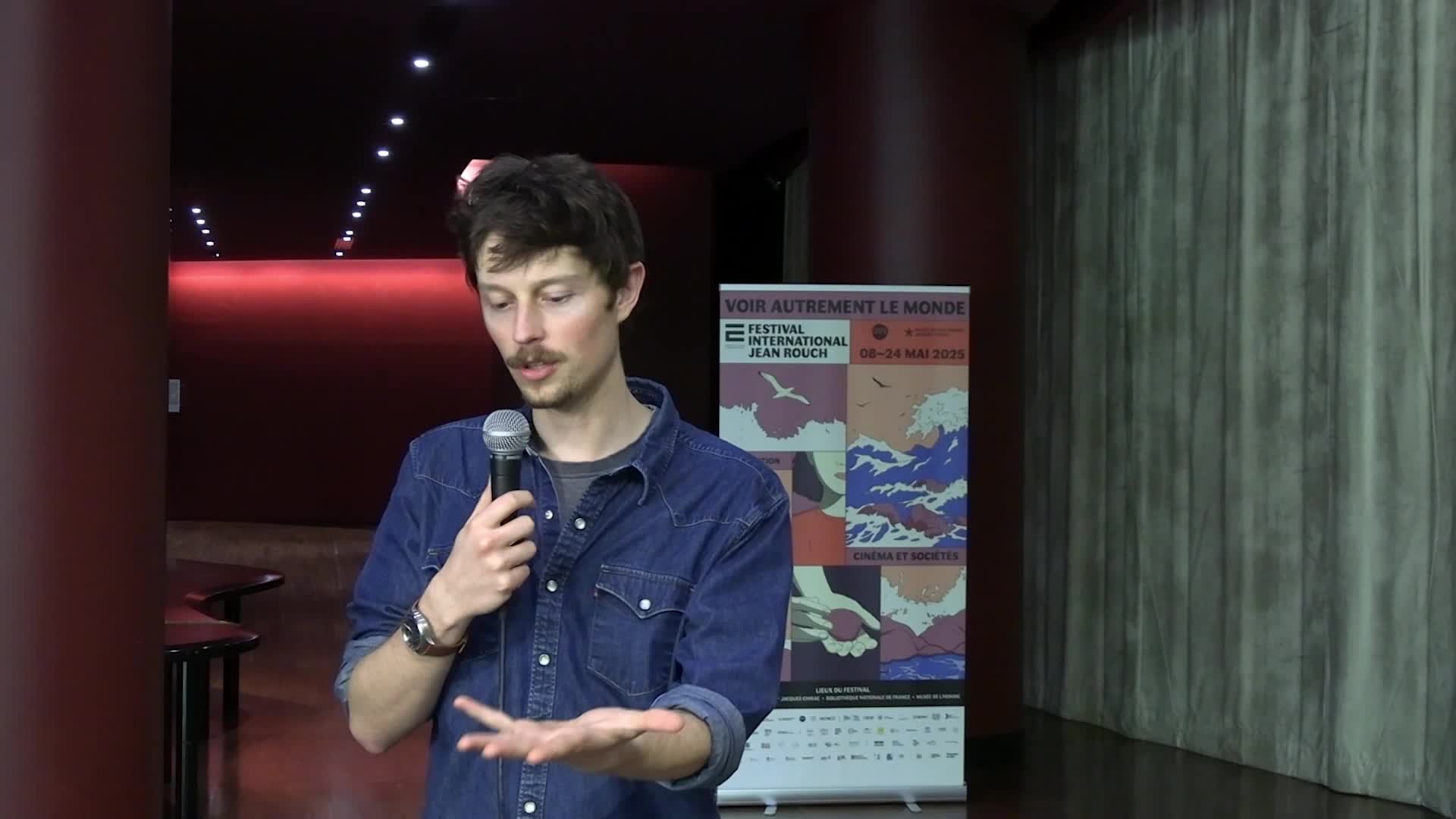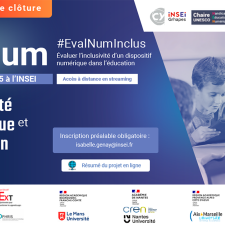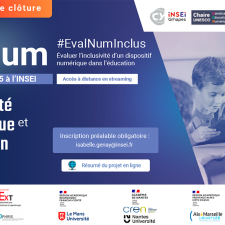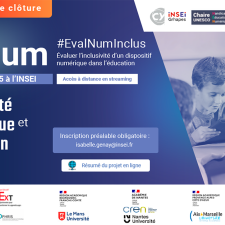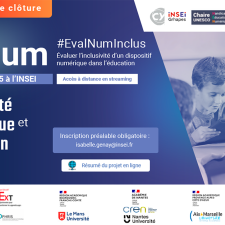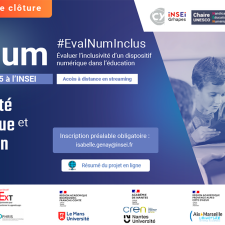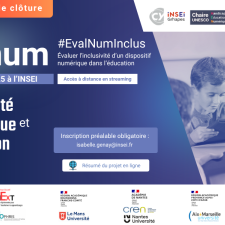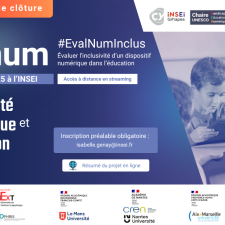Chapitres
- Learning experience of graduate students in an online accounting course using desktop VR under the light of the Activity Theory21'54"
- Adopting HyFlex in higher education in response to COVID-19: Students’ Perceptions and Perspectives19'37"
- Triple Hybrid (TriHy): What Happened When COVID Hit the Research Study18'44"
Notice
Educational models, configurations and practices - 02 - English
- document 1 document 2 document 3
- niveau 1 niveau 2 niveau 3
Descriptif
A conference proposed and organised by Cned, DMS and The Open University.
Session chair : Denise WHITELOCK
Learning experience of graduate students in an online accounting course using desktop VR under the light of the Activity Theory
Speakers : Kirsty PAOLI, Irina OTMANINE
Adopting HyFlex in higher education in response to COVID-19: Students’ Perceptions and Perspectives
Speaker : Assya BOUALI
Co-authors : Rachid EL GANBOUR, Mohamed DIHI
Triple Hybrid (TriHy): What Happened When COVID Hit the Research Study
Speakers : Ildiko PORTER-SZUCS, Barry DECICCO
Intervention / Responsable scientifique
Thème
Documentation
Learning experience of graduate students in an online accounting course using desktop VR under the light of the Activity Theory
While the interest in use of Virtual Reality (VR) in higher education is rapidly growing (Makransky et al., 2019; Radianti et al., 2020) and potential benefits of the use of VR have been identified (Moreira et al., 2020; Zhang et al., 2017), there is still a lack of information about the use of VR in higher education and continuous learning (Radianti et al., 2020). This study undertaken in the framework of Scholarship of Teaching and Learning approach explored the experience of MBA students in an online course in managerial accounting using VirBELA desktop Virtual Reality software, focusing on social presence and engagement perceived by the students. The qualitative study was conducted through interviews and participative observation, and all the data were analyzed using the framework of Activity Theory. Results showed that avatars and virtual spaces in VR as mediating artefacts helped to increase the social presence in the course during the class activities such as lectures or treasure hunt session. At the same time, students preferred usual web conference tools while undertaking a more complex activity of group work. The participants suggested strategies to follow to make the change management successful and to introduce VR into the online program.
Adopting HyFlex in higher education in response to COVID-19: Students’ Perceptions and Perspectives
While the coronavirus pandemic has been declared as a Public Health Emergency, educational ministries and institutions have unanimously opted for distance education as a solution to carry on teaching and learning worldwide. Flexible hybrid courses (HyFlex) are one of those innovative teaching devices that have emerged since the health crisis and aimed to achieve educational continuity and satisfy learners’ various needs. Based on a research model inspired by the different extensions of the technology acceptance model (TAM), we conducted a study with 249 students from the faculty of medicine and pharmacy affiliated with Mohammed First University in Oujda (Morocco) and who learned in a HyFlex environment during the 2020- 2021 fall semester. This research aimed to analyze the influence of perceptions of usefulness and ease of use of the HyFlex model and the facilitating conditions and individual characteristics, chiefly the availability of technological resources and the mastery of the computational tool on the behavioral intention of adopting this approach. The present study addressed students’ perceptions regarding the implementation of blended-learning and its dimensions. The results show that attitude, perceived usefulness, perceived ease of use and availability of technological resources are the main factors favoring the acceptance of elearning by the surveyed students.
Triple Hybrid (TriHy): What Happened When COVID Hit the Research Study
This pilot study investigated whether the success of students in a MA in Teaching English to Speakers of Other Languages (TESOL) assessment course was comparable regardless of their chosen mode of attendance in this “Triple Hybrid” (or “TriHy”) class. The three modes were face-to-face (F2F), synchronously online (SO), and asynchronously online (ASO). The study began in January of 2020, before the COVID 2019 pandemic reached the university. For ten weeks, the class was taught as originally designed. Due to the shutdown, for the remaining five weeks of the semester the formerly F2F group joined the SO group. Although the students’ success in the course did not differ, their perception of the factors that contributed to their success did. We can conclude that with considerable institutional support, substantial investment of time and commitment from the instructor, and meaningful choices from the students, the quality of instruction does not need to be compromised.
Dans la même collection
-
Modèles, pratiques et configurations pédagogiques - 07 - Francophone
CharlierBernadetteDessusPhilippeGérin-LajoieSergeEl MouhsineSaraAberkaneChaymaeÉvaluer les apprentissages des étudiants à distance : explorations des pratiques dans une université unimodale à distance. / Comprendre la dynamique de co-construction des environnements d
-
Modèles, pratiques et configurations pédagogiques - 06 - Francophone
MolinariGaëlleMraihiSaidaBossuAdelineZytnickiJérémyInteragir en situation de co-présence à distance : le cas du cours synchrone. / Entre interdépendance, autonomisation et autorégulation des acteurs dans les organisations pédagogiques à distance : les
-
Educational models, configurations and practices - 05 - English
ImpedovoMaria-AntoniettaDialloIbrahimaDefisNerysJonesMathewMazenodAnnaOnline International Collaboration: Teacher education beyond the borders. / Exploring the impact of student teachers' online collaborative peer reflection. / Multilingualism in the design and
-
Modèles, pratiques et configurations pédagogiques - 04 - Francophone
CharlierBernadetteLeferGaëlleChecchiKévin deDragoneLaetitiaDifférences dans la perception des enseignements hybrides et en présentiels des étudiants : indicateurs de réussite et leurs liens avec le sentiment d'efficacité personnel et la posture pédagogique. /
-
Modèles, pratiques et configurations pédagogiques - 03 - Francophone
BonfilsPhilippeArnetonMélissaBarbeFaustinBobocAncaGuezSarahLa réalité virtuelle au service d'une situation de handicap partagée en formation. / Instruments et environnement capacitant : quelques repères pour un enseignement à distance. / Hybridation de la
-
Modèles, pratiques et configurations pédagogiques - 01 - Francophone
Padoani DavidGracielaBergeyJean-LucCavignaux-BrosDorothéeHybridation des formations : appréhension des typologies et de leurs évolutions... pour une pédagogie bouleversée ? / La formation à distance et l'expérience apprenant en temps de crise sanitaire.
Sur le même thème
-
Causeries Pédagogie - Enseignement à distance #5 - IA et productivité pédagogique
PorlierChristopheBatierChristopheCauseries Pédagogie - Enseignement à distance #5 - IA et productivité pédagogique
-
Présentation du dossier journée Erasmus
Présentation du dossier en vidéo
-
- Le numérique au quotidien : pratiques et enjeux dans une classe soutenue par une ULIS-collège
AssudeTeresaFeuilladieuSylvianeBussezAlexandraMartinPerrineLe numérique au quotidien : pratiques et enjeux dans une classe soutenue par une ULIS-collège
-
Zsófia Paczolay et Dorian Rivière parlent de leur film "Je suis là"
PaczolayZsófiaRivièreDorianInterview de Zsófia Paczolay et Dorian Rivière pour leur film "Estou Aqui"/"Je suis là", en compétition à la 44ème édition du Festival International Jean Rouch en 2025.
-
Matthew Wolkow parle de son film "Eastern Anthems"
WolkowMatthewInterview de Matthew Wolkow pour son film co-réalisé avec Jean-Jacques Martinod "Eastern Anthems" en compétition à la 44ème édition du Festival International Jean Rouch en 2025.
-
Évaluer des usages du numérique à l'école primaire : un regard didactique sur des pratiques ordinai…
DupréFrédéricÉvaluer des usages du numérique à l'école primaire : un regard didactique sur des pratiques ordinaires
-
Usage du numérique dans une dynamique inclusive : impact d'une pratique coopérative sur l'accès aux…
Louge DupratMagalieUsage du numérique dans une dynamique inclusive : impact d'une pratique coopérative sur l'accès aux savoir.
-
Enjeux, principes et outils de l'observation in situ des usages pédagogiques inclusifs du numérique
BenoitHervéEnjeux, principes et outils de l'observation in situ des usages pédagogiques inclusifs du numérique
-
Le projet GTnum à l'échelle d'un territoire académique : témoignage de Julien Roche
RocheJulienLe projet GTnum à l'échelle d'un territoire académique : témoignage de Julien Roche
-
Un questionnaire académique pour donner à voir les pratiques numériques inclusives
DupréFrédéricBenoitHervéUn questionnaire académique pour donner à voir les pratiques numériques inclusives
-
Évaluer l'inclusivité d'un dispositif numérique dans l'éducation (GTnum) : état de l'art
Petry-GenayIsabelleBenoitHervéÉvaluer l'inclusivité d'un dispositif numérique dans l'éducation (GTnum) : état de l'art. Hervé Benoit et Isabelle Petry Genay, INSEI.
-
Ouverture de la journée GTnum#EvalNumInclus 2025
BenoitHervé"Évaluer l'inclusivité d'un dispositif numérique dans l'éducation"


